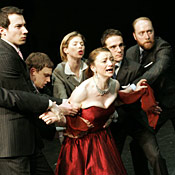The problem is not the single-room set or the nonspecific depressive naturalist look of the production, or even the occasionally abstracted, cadenced language...The main problem for me was the fallback naturalism of the style, which made what must read on stage as ambiguity read on film as inconsistency. Aggie's point of view--which, after all, as she hungrily adopts her new boyfriend's madness in order to stave off any more loneliness, is our entry into a purely imagined world--is kept at a distance. Close-ups of Peter's mysterious bloodsucking aphids--whether they exist or no--are notably missing. It's one thing to take Aggie's word for it that she does, in fact, see the bugs Peter so fervently believes in while she's yards away on a stage; it's another to do so when the camera could so easily give her eyeball-an-inch-away-from-his-finger-eye-view but chooses not to.
It's heartening to know that director William Friedkin, working with Letts' own script based on his play, understood the essential ambiguity of the concept: Are the bugs real or not? Is Peter the victim of a government conspiracy or a paranoid schizophrenic? Or maybe both? I feared that the film would decide and show us one way or the other. But clearly the decision not to show feels perverse; film has an omnivorous gaze, and we can feel it when it's withholding what we need to see.
And that's precisely what thrilled me about Bug onstage--that the ambiguity of the concept was irreducibly built into the theatrical experience. As intimate as the Barrow Street Theatre was, as claustrophobic as the play felt, we weren't close enough to see the bugs. It's an ancient stage trick--the flea circus--applied breathtakingly, even profoundly, to a drama of indeterminacy and perspective. And there's a reason why flea circuses don't work on film, as Chaplin inadvertently proved with his lachrymose efforts in Limelight
We hear a lot about the value of things that can "only be done" in the theater, but Bug was a case where a negative virtue--something a play can never do, unless it employs video cameras, which is to give us a close-up view--made it infinitely more powerful than anything a film could show us.





